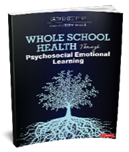- NJASA
- Community Corner February 2021
-
Five Lessons for New Jersey Schools
With the presidential transfer of power complete, the ills of society are figural, ready for us to learn from. Whether you feel vindicated or cheated, it’s clear we have considerable work to do on our evolutional continuum. The moral and ethical division in this country that bared itself through the political race, creating anguish on both sides; helplessness from intense worry about our future, exhaustion from escalating disagreements with family and friends and despair from the fragmentation of media, both mainstream and social.
The ability to disagree peacefully and constructively, to value differences even with different values, to recognize and embolden our most oppressed citizens, to decipher fact from fiction, and to balance our morality with the negotiation of ethics and values, are all paramount to both our healing and advancement. With this work emerges a new set of priorities, squarely affixed on the shoulders of our primary and secondary school systems, who will help ensure we prepare our next generation of decision makers.
Constructive Differencing: Conflict resolution has become antiquated. We can’t simply teach our students to disagree peacefully and expect they will gain the tools needed to bridge the great divide in this country. We need a concerted effort to prepare our educators to be facilitators for the meaningful exploration of differences that keep people connected. This is integral to the work of (P)SEL and must be top down.
Equity and Social Justice: With implicit and explicit racism fueling social injustice and catalyzing violence, it’s time for our curriculum to reflect this pressing need. From understanding the historical influences of oppression to the current economic disparity, we can’t solve complex problems like food deserts or institutional racism without proper and truthful education. This is also a component of (P)SEL, having to do with understanding how needs are not equal for all people.
Discernment of Information: We are inundated with information from social media making it difficult to root out fact from opinion. Confirmation bias is reinforced by the rapid spread of misinformation making it difficult to filter unbiased data. Schools need to help students learn how to vet sources of information, contrast opposing claims and make educated choices about complex issues. Educators will need to examine their own implicit bias but feel free to engage in this work with the support of families.
Ethics, Values, and Morals: Winning at all costs means losing, a lesson we need to learn from this election. If we defend our values without a balance of ethics, we risk damaging our moral compass. Integrity through transparency, honesty, and civility need to guide our process of debate, discussion and dialogue if we wish to maintain unity and order as a society. If we want our students to learn how to take ownership and be accountable, this work will be part and parcel of (P)SEL.
Power Balanced with Responsibility: If we want to prevent a Darwinian attitude from igniting our base instincts, we have to remember a simple premise. Those who hold influence must cautiously use it to empower others rather than to amplify their own agenda. This is a difficult lesson to learn in hierarchical systems where students have no agency. Advanced empathy is our greatest tool for this work, also a part of our (P)SEL future paradigm.
Trauma and Healing: The scaffolding of the pandemic, social justice issues, and an aggressively contested election means both chronic and acute stress on a massive scale. Adults and children are grappling with resiliency to endure without hope for timely relief. Psychosocial emotional learning to begin our recovery is required for any other academic agenda to succeed. Let’s ensure our integration of mental health, trauma, and (P)SEL is top down, so that we are embodying this work and not simply teaching it as a set of skills.
The contentiousness and raw rage that has gripped this country for the past four years is something that must be tended to and cared for as you would any other wound. Citizens who have been spending more time together than normal due to quarantines and lock-downs have often engaged in more heated conversations and disagreements between family members, creating trauma not only for the adults but children as well. As educators, this is an imperative opportunity to employ our best (P)SEL practices to help teachers and students address the endured traumas and move forward as academic performance and effectiveness becomes a major focus now that the election drama has passed, and we continue to deal with Covid-19.
Dr. Jared Scherz is a clinical psychologist, author, and consultant who has worked with educators for over 30 years. He earned his M.Ed. from Penn State University and became an elementary school counselor before gaining his Ph.D. in psychology. He has created innovative prevention and intervention programs in both rural and inner-city schools.
As the CEO of TeacherCoach, Jared’s mission is to develop educational ecosystems that bring new revenue streams into school districts, make schools the hub of wellness in their community, and blend personal growth and professional development for faculty. Through the first ever Learning Engagement System (LES), districts can meet the needs of both the individual and the organization. For more information about TeacherCoach, email coach@teachercoach.com or visit us at www.teachercoach.com.
Dr. Scherz’s latest book from Corwin Publishing




